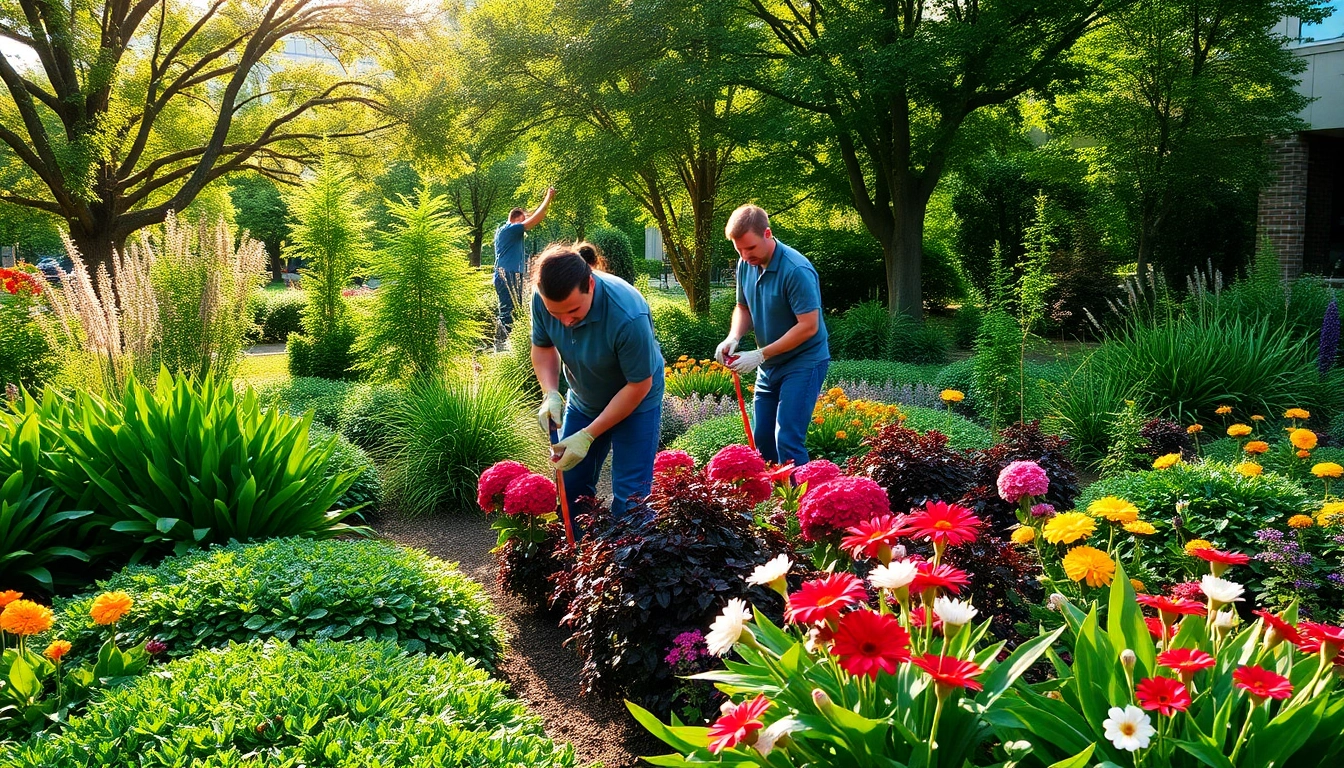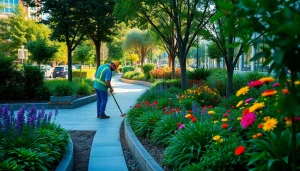Understanding the Role of Commercial Landscaping Contractors
Definition and Services Provided by Contractors
Commercial landscaping contractors play a pivotal role in the design, installation, and maintenance of outdoor spaces for businesses and public entities. Unlike residential landscapers, who focus typically on home gardens, commercial landscaping is tailored for larger venues including office parks, retail spaces, educational institutions, and other public properties.
The range of services provided by these contractors is extensive. They often begin with detailed landscape design and planning, which incorporates clients’ needs and preferences while aligning with the local environment. Typical services include:
- Landscape design and architecture
- Ground maintenance (mowing, pruning, fertilization)
- Irrigation system installation and maintenance
- Hardscaping (patios, walkways, retaining walls)
- Plant selection and installation
- Seasonal clean-up and snow removal
In essence, commercial landscaping contractors manage the holistic transformation of outdoor spaces to enhance aesthetic appeal and functionality, helping businesses create welcoming environments that reflect their brand’s identity.
Benefits of Hiring Professionals
Engaging commercial landscaping contractors brings numerous benefits to businesses, making it a worthwhile investment:
- Expertise and Knowledge: Professional landscapers possess an extensive understanding of plants, soils, environmental factors, and landscape design principles, ensuring that they create spaces that thrive and endure.
- Time-Saving: Managing landscaping projects can be time-consuming, requiring expertise at each stage. Hiring professionals allows business owners to focus on their core activities while ensuring that landscaping is handled effectively.
- Cost-Effectiveness: While there is an upfront cost associated with hiring professionals, their expertise can often prevent costly mistakes and lead to better long-term investments.
- Compliance and Safety: These contractors are knowledgeable regarding local regulations and safety standards, ensuring that all landscaping endeavors comply with municipal codes.
Common Misconceptions About Landscaping
Despite the clear advantages of hiring professional contractors, several misconceptions persist about commercial landscaping:
- It’s Just Mowing Grass: Many believe that commercial landscaping is limited to lawn maintenance. In reality, it encompasses a wide array of services aimed at enhancing outdoor environments, including design, installation, and sustainability initiatives.
- All Landscapers Are the Same: There’s a significant difference in skill levels among contractors. Some specialize in specific niches or types of landscapes, emphasizing the importance of selecting the right contractor based on one’s unique needs.
- It’s a Luxury: Landscaping is often seen as an unnecessary expense. However, well-maintained landscapes can increase property value, attract customers, and create a more pleasant environment for employees.
Key Factors to Consider When Hiring
Evaluating Experience and Portfolio
When selecting a commercial landscaping contractor, one of the first steps should be to evaluate their experience and portfolio. A well-established contractor will often have a diverse portfolio showcasing previous projects that reflect their capabilities and design style.
Look for:
- Years in business and their expertise in commercial environments.
- Examples of completed projects that align with the scale and style you envision for your own.
- Case studies detailing challenges faced during a project and how they were overcome.
Assessing Licensing and Insurance
Licensing and insurance are critical factors that contribute to the safety and legality of your landscaping project. Ensure that any contractor you consider is licensed to operate in your locality. This typically involves meeting specific state requirements regarding education, experience, and examinations.
Similarly, insurance acts as a safeguard. A contractor should have both liability insurance and workers’ compensation. Liability insurance protects you from damages that might occur during the job, while workers’ compensation safeguards you against claims if a worker is injured on your property.
Understanding Customer Reviews and References
Customer reviews and references are invaluable when assessing commercial landscaping contractors. Reviews often provide insight into the contractor’s reliability, quality of work, and customer service. Seeking out testimonials or references from previous clients allows you to gauge how satisfied others were with their services.
When evaluating reviews, consider:
- The overall rating and how many reviews the contractor has received.
- Specific feedback regarding timely project completion, communication, and quality of work.
- The contractor’s responsiveness to concerns and issues raised by clients.
The Importance of Sustainable Landscaping Practices
Eco-Friendly Solutions in Commercial Landscaping
Sustainability has become a pivotal aspect of commercial landscaping. More businesses are recognizing the importance of eco-friendly practices, not only to reduce their environmental impact but also to appeal to a growing base of environmentally conscious consumers.
Some eco-friendly solutions include:
- Utilizing sustainable materials in hardscaping and other landscaping features.
- Implementing organic landscaping practices that avoid harmful chemicals.
- Designing landscapes that promote biodiversity and natural wildlife habitats.
Implementing Native Plants for Better Adaptation
Incorporating native plants into commercial landscaping can significantly enhance sustainability efforts. Native plants are adapted to the local climate and soil conditions, thus requiring less water and maintenance while thriving naturally. Furthermore, they support local ecosystems and wildlife, promoting biodiversity.
When choosing native plants, consider factors such as:
- Local climatic conditions and the specific environments where plants will thrive.
- Potential interactions with local wildlife, including pollinators.
Water Conservation Techniques
Water conservation is imperative in landscaping, especially in areas prone to drought. Implementing xeriscaping principles can greatly reduce the need for irrigation by using drought-resistant plants and designing landscapes that develop moisture retention.
Strategies include:
- Installing efficient irrigation systems like drip irrigation that deliver water directly to the roots.
- Utilizing permeable pavers to allow rainwater to be absorbed naturally into the ground.
- Scheduling watering during the early morning or late evening to minimize evaporation.
Budgeting for Your Landscaping Project
Understanding Pricing Structures
Effective budgeting is integral to any landscaping project. Understanding the various factors that contribute to pricing can help you avoid overspending while still achieving your desired results. Typically, costs will include:
- Materials for plants, soil, rocks, and hardscapes.
- Labor costs, which can vary widely based on the project’s complexity and scale.
- Maintenance and upkeep costs for ongoing care.
Discussing these factors with your contractor will provide a clearer picture of the total investment required.
Estimating ROI on Landscaping Investments
Investing in professional landscaping can yield significant returns. Studies suggest that well-designed landscapes can increase property values by up to 20%. To estimate the expected ROI, consider the following factors:
- Initial costs versus expected increases in property value.
- Potential energy savings achieved through effective shade and windbreaks.
- Attraction of new customers through enhanced aesthetic appeal.
These elements should be weighed against your overall business goals and financial objectives.
Negotiate Terms and Expectations
Once you’ve settled on a contractor, negotiating terms is crucial. Clear expectations regarding timelines, costs, and project deliverables can prevent misunderstandings down the road.
Key negotiation points include:
- A detailed proposal outlining the scope of work.
- Payment terms, including deposits and installment arrangements.
- Maintenance responsibilities post-project completion.
Maintaining Your Landscape Post-Installation
Creating a Maintenance Schedule
Landscaping is not a one-time investment; ongoing maintenance is essential to preserve the beauty and longevity of your outdoor space. A well-structured maintenance schedule tackles various tasks such as:
- Regular mowing and pruning to keep grass and plants healthy.
- Seasonal fertilization to promote growth and vitality.
- Inspection and maintenance of irrigation systems to ensure efficiency.
Identifying Common Landscape Problems
Even with routine maintenance, landscapes can encounter challenges. Recognizing common problems early can mitigate damage:
- Pest infestations that can compromise plant health.
- Weed overgrowth that competes for resources.
- Soil erosion that can undermine hardscapes and plant roots.
Consulting with a contractor can assist in troubleshooting these issues effectively.
When to Consult a Landscaping Contractor Again
Landscapes evolve, and the needs of your property can change over time. You might need to consult a landscaping contractor when:
- Adjusting the layout or introducing new features to cater to changing business objectives.
- Experiencing significant landscape challenges requiring expert intervention.
- Planning seasonal enhancements, such as holiday displays or new planting strategies.
By understanding the role and value that commercial landscaping contractors provide, businesses can make informed decisions that enhance their outdoor spaces sustainably and effectively.








